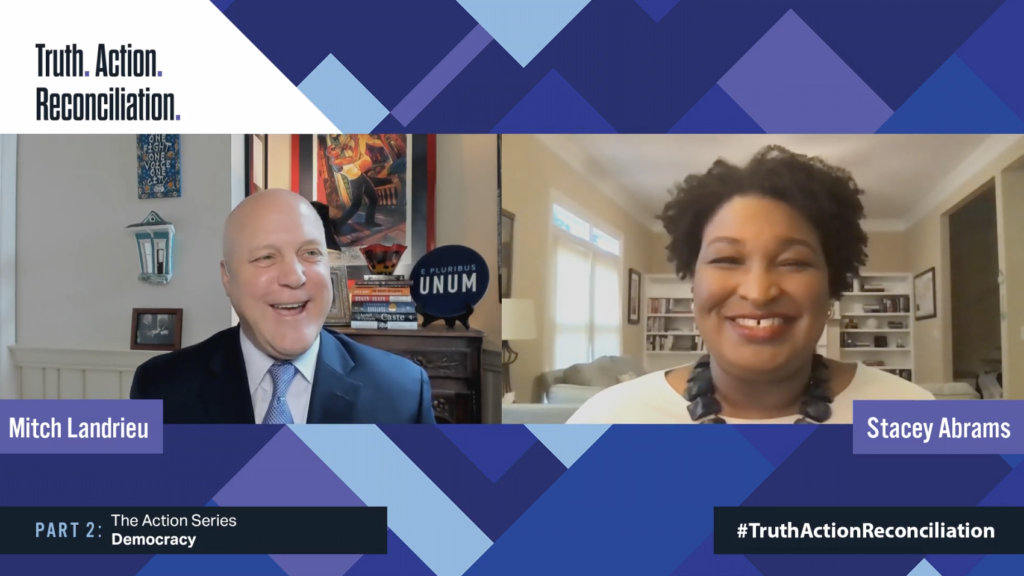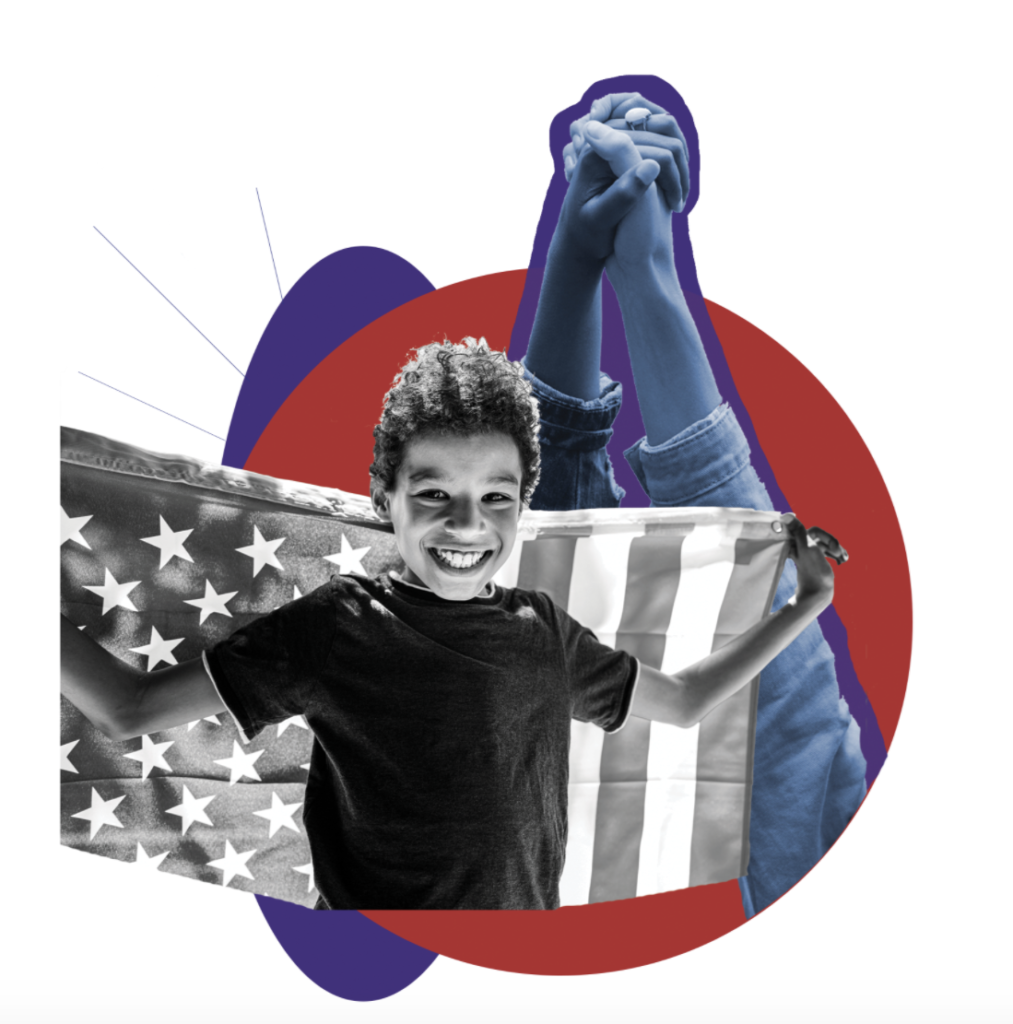Narrative Change
Because it is often uncomfortable or difficult to discuss the impacts of systemic and interpersonal racism openly and honestly, many people lack an understanding of the magnitude of racism in America. People must be able to talk productively about racism and inequity in order to create change. Simply put, you cannot change what you do not acknowledge. EPU’s narrative work continues to create opportunities for discussion on the lasting impact of racism on people and institutions and, as a result, moves the nation forward in its pursuit of racial equity.
Approach
Our narrative change work targets white Southerners who view themselves as opposed to racism but have fallen short of actively becoming part of the solution. Our approach is to Educate, Engage, and Inspire our audience by meeting people where they are, providing information without blame, creating personal and tangible ways to act, and illustrating how the South can be redefined as a welcoming place for all.
Insight
In the last year, our nation reached an inflection point: the COVID-19 pandemic continued to lay bare inequities within our nation’s systems, the fight for racial justice continued driving community members to act, and an insurrection at the U.S. Capitol threatened the very existence of our democracy. EPU responded to the moment and activated narrative programming that supported the importance of recognizing that slavery and Jim Crow are not things of the past; their systemic and interpersonal impacts are still deeply felt today by many people. We learned that in order to change systems, we must change hearts and minds. We focused on empowering storytelling that highlighted the impacts of racial injustice in our institutions to provide the context needed to ensure our full and accurate racial history is told despite how inconvenient or difficult it is for some to acknowledge.
Program Highlights
With in-person activations limited by the COVID-19 pandemic, EPU engaged audiences around our narrative work by creating virtual programming that was accessible, interactive, and impactful.

Truth. Action. Reconciliation.
From the rise of the Black Lives Matter movement in the summer of 2020 to the insurrection at the U.S. Capitol, EPU identified these moments of darkness as an inflection point for our nation. It was critical to examine where we’ve been so that we can plot an equitable path forward together. That’s why we hosted the series, Truth. Action. Reconciliation. The series of 11 virtual and digestible conversations leveraged the moment to contribute to lasting change.
Our country’s brightest minds and effective leaders shared their insights and learnings as they answered the questions:
- How did we get to where we currently are on criminal justice, health equity, economic opportunity, and democracy?
- How do we create the America that is worthy of her promise?
As we moved into the final installment of the series centered on Reconciliation, the events of Jan. 6thillustrated to us and the nation that we were not yet ready or able to have the conversation we intended. Instead, we shifted our thinking around the end of the series end and hosted an impactful conversation around the racial reckoning that the nation was going through and the reckoning still left to be done that would get us to a point in which reconciliation could be possible. Nearly 55,000 viewers tuned in to watch the series, prompting the development of community discussion guides for EPU’s ongoing work.
CRIMINAL JUSTICE
HEALTH EQUITY
ECONOMIC EQUITY
Conversations for an Equitable South
Building on the success of our 11-part “Truth. Action. Reconciliation.” series, Conversations for an Equitable South brought together some of our country’s great thinkers, activists, advocates, and leaders on the current issues of race and equity in the American South.
These six conversations provided a space to discuss the lasting impact that racism has had on people and institutions and, as a result, will inspire action with the intention of creating racial equity within our communities. Overall, Conversations for an Equitable South has garnered nearly 70,000 views since its start in early 2021. Topics have included:
- Bold local and corporate leadership
- The role of white women to stop the perpetuation and building systems of racism
- The fallacy of racial colorblindness
- Reckoning with the idea of racial reconciliation

Divided by Design Podcast
We know that the concept of race permeates every facet of our lives. And yet, too few people – particularly white people – truly understand the history of racism and how that history is still invasively present in today’s institutions. That’s why we at E Pluribus Unum decided to work with Next Chapter Podcasts to produce the seven-part podcast series called Divided By Design exploring systemic racism as it exists in America.
Divided By Design includes conversations with advocates, historians, and experts to help us more clearly see what systemic racism really looks like. The podcast pulls clips from EPU’s Truth. Action. Reconciliation. conversation series in 2020 and 2021, as well as interviews from EPU’s tour of the South in 2019. All seven episodes allow listeners to move quickly from one topic to the next. By better understanding how we got to this moment, we can better chart a path forward towards a more just, inclusive, and equitable America for us all. This podcast aids in that understanding and has reached over 30,000 views on our website.


BROOK BALDWIN

NATASHA CLOUD
Listening Loudly
Our Listening Loudly series was created to highlight the personal stories and life experiences of participating guests through the lens of race. EPU Founder Mitch Landrieu engaged guests in conversations on Instagram Live, including WNBA star Natasha Cloud and former CNN Journalist Brooke Baldwin.
Each guest shared their influences and challenges, and discussed issues of race, class, privilege, and power. The series has supported EPU in reaching new audiences through the influence of the guests and their audiences, followers, and fans. Listening Loudly has been viewed by over 4,000 people on EPU’s Instagram channel.
Hometown Heroes
Our research shows that one of the central points of unity that Southerners share is our love of the region. EPU created Hometown Heroes, an Instagram Live series, to tap into this pride for our Southern community and ask fellow Southerners what they love most about their hometown. By celebrating our commitment to the South and what we have in common, we contribute to the creation of a more equitable South.
Participants such as Chef Cat Cora, Activist Zy Bryant, and Artist Brandan “Bmike” Odums shared what they’ve learned from their hometowns, how their hometowns have shaped them, and the opportunities for their hometowns to become more inclusive. The Hometown Heroes series has garnered more than 12.5k views.
SOME EXAMPLES OF WHAT WE HEARD
Southern Voices: A Reflection of America
Listening, learning, and truly understanding one another’s life experiences connects us as humans and ensures we can face the challenges of this moment as one. We heal stronger and rebuild better.
EPU created the Southern Voices: A Reflection of America campaign to facilitate constructive dialogue – allowing us to find common ground rooted in what truly matters – and ultimately inspiring others to stand in solidarity with the movement toward racial equity. The Southern Voices campaign gathered user-generated video content and provided a forum for participants to join the conversation and share their unique perspectives about issues across their personal social media channels. The campaign amplified the voices of more than 150 dedicated community members who shared truthful and diverse experiences to shift perspectives and expand the hearts and minds of viewers across the nation.
Racism is No Joke
Comedy is a superpower, and racism is a crisis. So, what happens when we invite comedians to interrogate the taboos, make the uncomfortable truths funny, and invite people to laugh and think at the same time? We decided to find out through an out-of-the-box project called #RacismIsNoJoke.
EPU teamed up with the Center for Media & Social Impact (CMSI) for a Comedy Think Tank, a CMSI co-creation workshop initiative that pairs comedians and social justice organizations to create entertaining comedy that sparks public engagement in social issues. We invited introspection into what it means to be “Southern.” Well-known Southern comedians, Georgia native Corey Forrester and Mississippi native Jay Jurden, explored and unpacked complex issues, systemic racism, and what it means to be southern in eight videos. The campaign received nearly 2 million viewer impressions and 300,000 engagements.
#SleightofHand Magic Videos
Despite much progress over the last 60 years, we are still fighting to ensure that access to systems like healthcare, justice, and democracy are not obstructed. As part of our effort to reach people who have not historically been engaged in racial justice efforts and help them understand the lasting impacts of racism, EPU developed a unique approach to storytelling through the #SleightofHand campaign. The campaign used “magic” to demonstrate how we are not seeing the systemic racism that is often in plain sight.
Engagement
In EPU’s Divided By Design findings, we noted that faith leaders and institutions can play a powerful role in bringing communities together and facilitating discussions on race. Faith leaders can help shape, and therefore change, the narrative. With that perspective, EPU conducted the Southern Faith Leaders Listening Sessions, a series of six facilitated discussions with leaders of different faith traditions on issues of race and equity. Thirty faith leaders from 10 faith traditions participated, representing Catholic, Jewish, Muslim, and various Protestant and Christian denominations. Participants included a mix of ordained and lay leaders, men and women, and multiple races and ethnicities. The listening sessions provided insight around:
- How faith leaders and official texts present issues of race to congregants,
- Challenges and tensions between decisions at the institution’s leadership level and the congregation level, and
- The types of support and activities that would help faith leaders engage effectively with their congregations around issues of race and inequity.
The findings gleamed from the listening sessions also led to the development of a joint project between EPU and the Public Religion Research Institute for further research on the messaging around the intersection of faith and memorialized spaces. The project kicks off in 2022.
“I believe that anyone can change their thoughts and beliefs, it is more of the question if they want to change. People have to want to do it and execute the process to make the change.”– Nick, 30s Black Male and Independent from Georgia
– Nick, 30s Black Male and Independent from Georgia
Southerners in Conversation
In May of 2021, EPU and More in Common (MIC) launched the Southerners in Conversation (SINC) project, a qualitative research panel of about 180-200 participants from the 13 Southern states that are the focus of EPU’s current work. The goal of Southerners in Conversation was to investigate underlying motivations and drivers of attitudes on race, racism, and anti-racism in the South. The project built on insights from E Pluribus Unum’s Divided by Design foundational research and will illuminate processes that contribute toward improving race relations in the region.
Explanations behind views and behaviors specifically on issues of race are rarely straightforward but are instead manifestations of people’s inner positions, external experiences, and narratives that are distinctly Southern. The existence of deep-rooted experiences and perpetuation of racism side-by-side with the concepts of Southern hospitality and neighborly pride has always been a paradox of the South. Southerners in Conversation shows how this contradiction is possible, as well as underlines that there is more that unites than divides us as Southerners.
Racial attitudes and beliefs are frequently examined through public polling research, but Southerners in Conversation takes the investigation much deeper. Moving beyond a surface-level understanding of race-related issues and considering the psychological underpinnings of contemporary attitudes, the longitudinal qualitative research project examined how different racial groups develop, act upon, and shift their narratives and attitudes on race-related issues. Southerners in Conversation will inform our efforts to foster healthier relations among people from different groups.
HIGHLIGHTS
- For sustainable positive shifts in racial narratives and relations to occur, Southerners need to experience healthy and inclusive narratives in their everyday lives.
- Regardless of political affiliation and racial background, most of us hope for less division and more emphatic and efficient leaders. Our neighbors across the region are open to discussing topics that are often perceived as controversial or difficult.
- Experiences and perceptions of belonging with our families and neighbors in our own communities play a more significant role in shaping beliefs, rather than national current events.
Cross-race relationships improve as Southerners spend time with individuals from other races, developing friendships and participating in cultural traditions, such as events around sports and cuisine.
